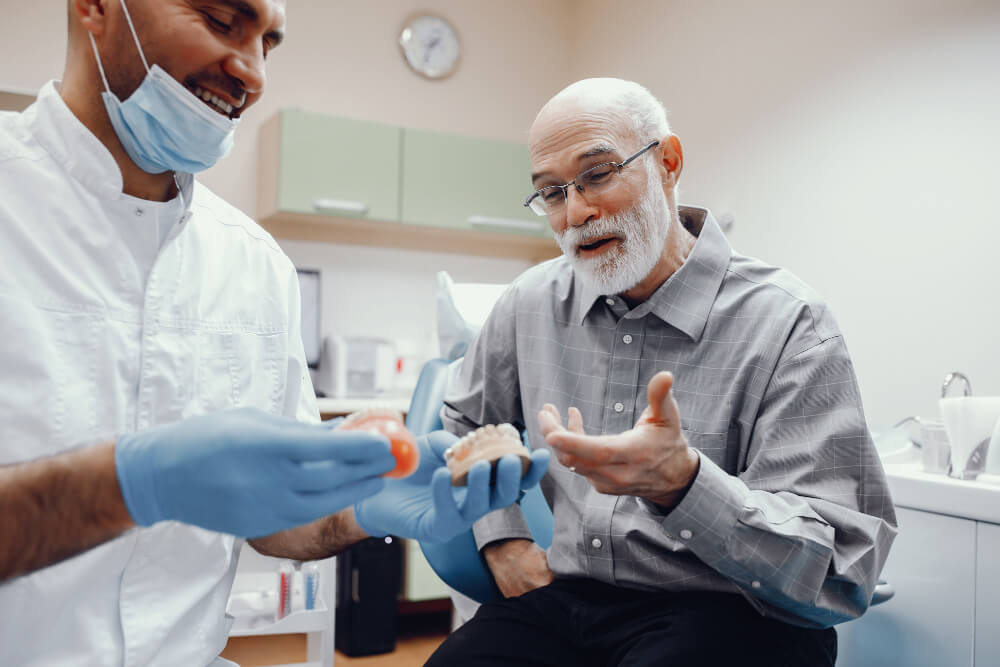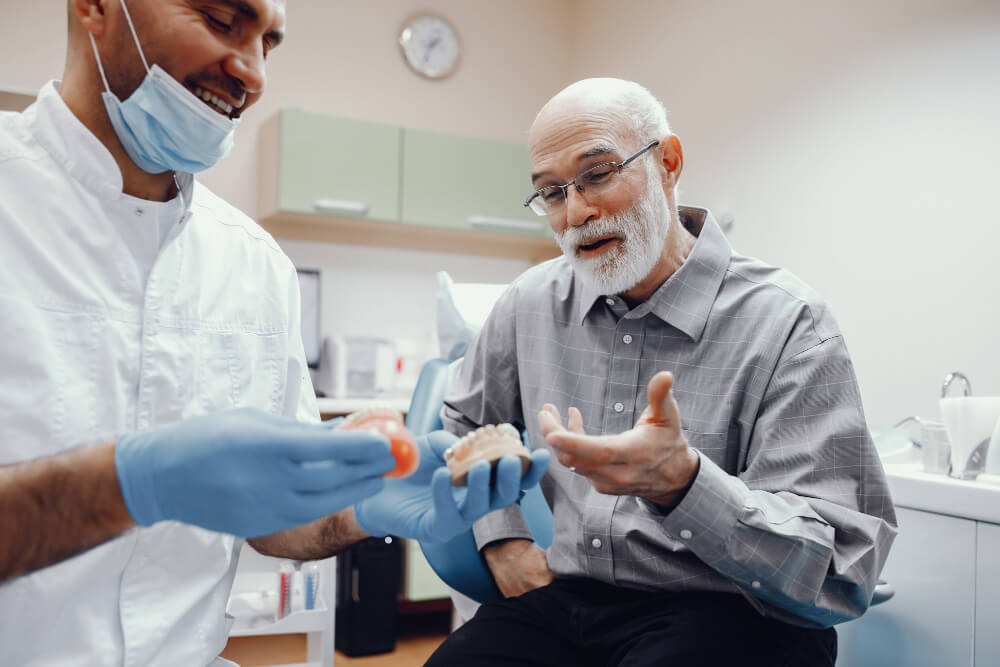Table of Contents
ToggleTooth loss becomes more common with age, and its effects reach well beyond looks for Australians over 60. Tough foods get harder to chew, speech can lose some clarity and the jawbone starts to thin without the signals natural teeth once gave it. Dentures can help, yet many people find them loose or uncomfortable day to day. That’s where dental implants step in. Fixed to the jaw, they feel secure and give you the strength you need for eating, speaking and smiling with confidence. Success rates is high and for many, they offer a steady, long-term answer rather than a short-term fix.
Am I Too Old for Receiving Dental Implants?
Short answer, no. Age is not the deciding factor. Your dentist will look at your overall health, the state of your gums and the amount of bone available, then tailor the dental implants Sydney treatment to suit. If needed, they’ll coordinate with your GP, review medicines and suggest steps like grafting to build solid support.

Who Is A Good Candidate After 60?
During the consultation, your dentist will often order a CBCT 3D scan to measure bone and identify key anatomy. They will then go through your medical history, with a close look at blood thinners, diabetes control and any bisphosphonates. Healing is better when you do not smoke, keep your mouth clean and maintain stable health. Even with thinner ridges, grafting or a sinus lift can create a sound base for fixtures.
Implant Options That Fit Real Needs
Treatment ranges from a single implant and crown to an implant bridge that replaces a short span, through to implant-retained overdentures for those tired of loose plates. Full-arch solutions offer a fixed set of teeth to four to six implants per jaw. The dentist will explain the benefits, limitations and expected dental implant price for each option so you can make informed decisions.
What to Expect from The Process?
It starts with a consultation and imaging to map your jaw. If any preparation is needed (such as extractions or grafting), that happens first. On the day of the surgery, the implants are inserted under local anaesthesia, with IV sedation available if you’d like extra comfort. Over the next few weeks to months the bone bonds to the titanium in a healing phase called osseointegration. In carefully selected cases, temporary teeth can be fitted straight away. Your final crown, bridge or denture is attached once the site has healed and your bite is confirmed.
How Implants Protect the Jaw
It’s the teeth roots stimulate the jawbone. When a tooth is lost, that area loses load and the bone shrinks. Implants transmit chewing forces into bone again, helping preserve volume and supporting facial shape. That is why patients often notice not just better chewing but a steadier jawline and clearer speech.
Recovery tips tailored to older adults
Here’re a few tips to recover quickly:
- Control swelling: Use cold packs on and off for the first couple of days.
- Manage discomfort: Take prescribed pain relief as directed rather than waiting for pain to build.
- Eat for healing: Choose soft, protein-rich foods like eggs, yoghurt, soups and stews. Drink plenty of water.
- Keep it clean: Brush carefully with a soft brush around the surgical area and follow the hygiene routine your clinician provided.
- Mind your health conditions: If you have diabetes, keep blood glucose in range.
- Show up for reviews: Early check-ups catch small issues before they turn into bigger ones.
Risks, success and what the evidence shows
All procedures carry some risk. With implants, the main concerns are infection, early failure, inflammation around the fixture (peri-implantitis) and, in certain sites, nerve or sinus complications. That said, precise planning, clean surgical technique and consistent home care reduce these risks. Research shows older adults do well when overall health, gums and bone are in good shape, and when follow-up visits stay on track.
Historical data show that 1 in 3 Australian adults aged 65 and over had lost all their natural teeth in 2013, underscoring the need for dependable function rather than short-term fixes.
The success of dental implants among seniors is well documented. Age alone is not a barrier to predictable results. A systematic review focused on older patients reported post-loading survival of about 97.7% at one year, with strong outcomes maintained in multi-year follow-up.
Broader long-term analyses at the implant level place 10-year survival around 96%, confirming durability when cases are well planned and maintained. In short, medical fitness and gum health matter more than the number on a birthday cake.
Costs and Long-Term Value
Implant dentistry is bespoke. Fees reflect the number of fixtures, need for grafting, type of restoration and laboratory work. Patients often ask about teeth implants cost, not just as a headline figure but as value over time. Fixed implant teeth do not slip, they protect bone and, with good care, they are designed for the long haul. That makes the comparison different to short-term options that may need frequent replacement.
For those budgeting by city, you will see discussions of dental implants cost Sydney in consumer forums and clinic pages. Look beyond the single figure. Ask for a full plan that covers imaging, surgery, abutments, provisional and final teeth, reviews and maintenance. Transparent quote allows a fair comparison between providers and avoids surprises.
Many readers also look for affordable dental implants Sydney. Affordability comes from staging the work, choosing the right materials and aligning expectations with biology. A frank conversation about must-haves versus nice-to-haves can keep quality high without overextending finances. Superannuation early release on compassionate grounds may apply in select scenarios, and some patients use health fund rebates toward parts of the treatment.
Daily Care That Keeps Implants Healthy
Brush twice daily, floss around implant sites and attend professional cleans as advised. Tell your dentist early if you notice bleeding, swelling or a change in bite. Prevention is simpler than treating inflammation around an implant.

Questions Worth Asking at Your Consult
- Am I a candidate for a single implant, bridge, overdenture or full-arch approach?
- Do I need grafting or a sinus lift, and what is the healing time?
- What is included in the quote and how will we manage my medications?
- How will we maintain the implants over the first year and beyond?
Final Thought
Dental implants after 60 are about enjoying food, conversation and confidence again. With clear planning, sound hygiene and regular reviews, the result is stable teeth and a jaw that stays supported for years.
Frequently Asked Questions
Am I too old for dental implants after 60?
No. Age by itself is not the deciding factor. Suitability depends on overall health, gum condition and bone quality. Studies on older adults show high survival rates, including about 97.7% at one year and around 96% at ten years when cases are well planned and maintained.
How long does treatment take from consult to final teeth?
Most people complete treatment in three to six months, depending on healing time and any grafting. Same-day teeth are possible for select cases with good bone and a stable bite.
Will the procedure hurt?
Implants are placed under local anaesthesia, with IV sedation available if needed. Expect mild to moderate soreness and swelling for a few days, which is usually manageable with prescribed pain relief and cold packs.
Do I need a bone graft or sinus lift?
Your dentist will check with CBCT imaging. If bone is thin or missing in key areas, grafting or a sinus lift may be recommended to support the fixtures and the planned bite.
How long do implants last?
With good hygiene and professional care, implants are designed for long-term service. Many last for decades, although no treatment can be guaranteed for life.


